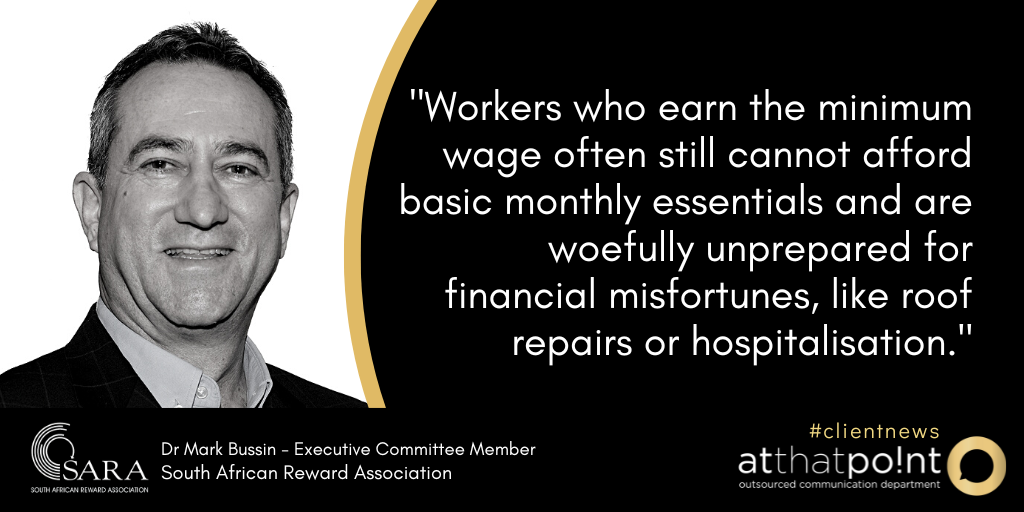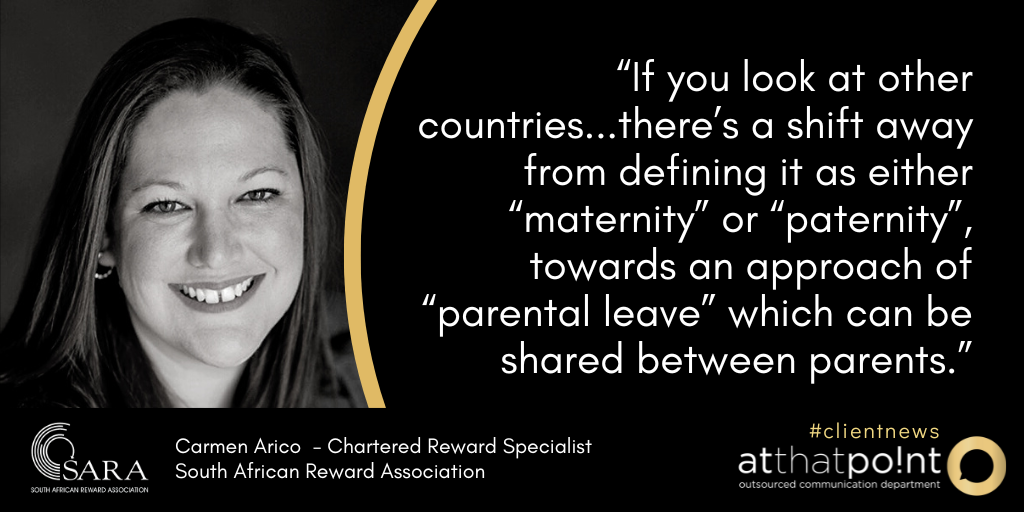 Employers should pay their workers a living wage and not just the national minimum prescribed by law. This is according to Dr Mark Bussin, Master Reward Specialist and Exco member of the South African Reward Association (SARA). "An employee's monthly pay should be at least R12,000 to R15,000 for a 40-hour work week," he says. Bussin defines a living wage as remuneration sufficient for an individual and their family to have a frugal yet dignified lifestyle. "Workers who earn the minimum wage often still cannot afford basic monthly essentials and are woefully unprepared for financial misfortunes, like roof repairs or hospitalisation," he says. Business impact What many employers don't realise is that financial distress among workers is bad for business. The strain of not earning enough and constantly struggling to survive can negatively affect employees physically, emotionally and cognitively. In an August 2013 Science journal article, researchers Mani, Mullainathan, Shafir and Zhao observed that a lack of money led study subjects to make poorer decisions. They hypothesised that poverty reduced focus and effort, resulting in inferior performance. So the stress associated with financial hardship causes employees to make errors in judgement and inhibits their productivity. It also prevents them from reaching their full potential, increases absenteeism, and results in higher turnover rates. "These effects can reduce business performance in the short term and hinder economic growth over time," warns Bussin. Replacing workers will not solve the problem if most of them face the same predicament. Trapped in poverty According to estimates from PwC, the University of Cape Town and the Tshwane University of Technology, the national minimum wage level for 2022 of R23,19 per hour is only around half to a third of the current living wage. It is not possible for low-income workers to survive on these amounts and they are often forced to turn to unlicensed money lenders for additional cash to make up the shortfall. Saddled with unregulated terms and high interest rates, they soon become trapped in a vicious cycle of borrowing from Peter to pay Paul. As they end up poorer than before, their descent into negative income can see their quality of life spiral. Being unable to look forward to tomorrow or plan for a better future can have dire physical and mental health consequences for them. Breaking the cycle Employers who pay a living wage are instrumental in the eradication of poverty. Employees with disposable income are not only happier and more productive at work but are also more active in the market, stimulating economic growth. In addition, workers do not need to engage in risky lending to make ends meet, reducing their exploitation by the unscrupulous. Therefore, the argument for a living wage is not only a moral one that focuses on business' obligation to society. It is also a strategically sound investment that, as it lifts up the poor, creates a more prosperous business environment for companies and citizens alike. "The more companies that decide to embrace a living wage, the greater the positive effect will be," says Bussin. ENDS MEDIA CONTACT: Rosa-Mari Le Roux, [email protected], 060 995 6277, www.atthatpoint.co.za For more information on SARA please visit: Website: www.sara.co.za Twitter: @SA_reward LinkedIn: South African Reward Association Facebook: SARA – South African Reward Association
0 Comments
 In South Africa, fathers are entitled to 10 days parental leave upon the birth of the employee's child in terms of the Labour Laws Amendment Act. Mothers are entitled to 4 months unpaid maternity leave. However, this legislation has been brought into question. In a recent case* filed at the High Court, Werner and Ika van Wyk argue that certain provisions of the Basic Conditions of Employment Act (BCEA) should be ruled unconstitutional because they unfairly discriminate against fathers of newborn children. This by unjustifiably restricting their rights to paternity leave in South Africa. According to Carmen Arico, Chartered Reward Specialist and spokesperson for the South African Reward Association (SARA), local legislation does indeed need to be leveraged for different parental options. This could include more time off for fathers, or a situation where parents themselves can decide how parental leave is split to best fit their individual needs. Laws and policies must adapt to the changing times “If you look at other countries, particularly those in Scandinavia, there’s a shift away from defining it as either “maternity” or “paternity”, towards an approach of “parental leave” which can be shared between parents. This keeps in mind how traditional family arrangements have evolved to now include same-sex couples, single parents, and co-parenting families.” She believes that in order to be effective, employers must keep changing circumstances and societies in mind. “Less than half of working age women were employed in the 1970s, and men often didn't spend much time with their families. However, that has changed. Nowadays, men meaningfully engage with their kids around seven times more often than they did in the past. And this is something they want to do.” Arico notes that though many local employers still don't seem particularly eager to formalise a flexible parental leave approach for various situations, she does believe lockdown has started to change the view of a lot of companies. “Employees now have much more freedom, and ideally this trend will extend to parental leave as well.” Fulfilled employees add value in the long term Arico adds that flexible parental leave could be a valuable asset for a company’s Employee Value Proposition (EVP). “Instead of viewing it as a drawback where you now have to give more time off for male employees, for instance, it should be viewed as what it is: an engagement driver. In light of these legal rulings, employers ought to think about offering flexible parental leave policies to staff members. It fosters an atmosphere where workers want to come back to the company following their parental leave.” Arico further emphasizes that South Africa's constitution is among the most progressive in the world. "When it comes to ensuring that there is no discrimination based on gender, sexual orientation, or any other factor, we serve as an example to others. I do believe that the Labour Laws Amendment Act must follow suit in the parental leave area in order to recognize the various familial structures and parental roles.” She concludes by noting that South Africa's employers generally get things right. “If we can now also change the thinking of “maternity versus paternity” and move towards a parental view, then we are a long way to being that progressive country we want to be seen as.” ENDS MEDIA CONTACT: Rosa-Mari Le Roux, [email protected], 060 995 6277, www.atthatpoint.co.za For more information on SARA please visit: Website: www.sara.co.za Twitter: @SA_reward LinkedIn: South African Reward Association Facebook: SARA – South African Reward Association |
Archives
March 2023
Welcome to the South African Reward Association newsroom.
Categories
All
|

 RSS Feed
RSS Feed